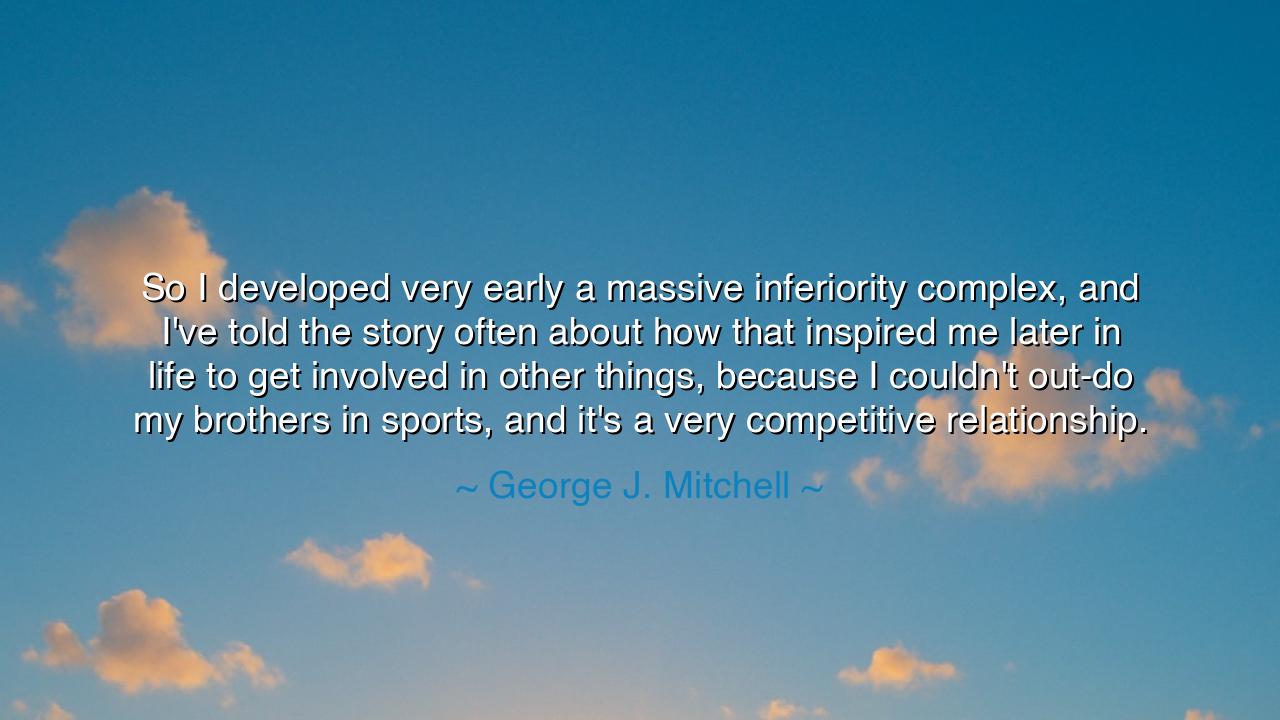
So I developed very early a massive inferiority complex, and
So I developed very early a massive inferiority complex, and I've told the story often about how that inspired me later in life to get involved in other things, because I couldn't out-do my brothers in sports, and it's a very competitive relationship.






When George J. Mitchell confessed, “So I developed very early a massive inferiority complex, and I've told the story often about how that inspired me later in life to get involved in other things, because I couldn't out-do my brothers in sports, and it's a very competitive relationship,” he was not speaking in shame but in wisdom. His words reveal the strange alchemy by which weakness can be transformed into strength, and disappointment into destiny. The wound of inferiority, felt in youth, became the seed of a life spent in law, politics, and peacemaking. What seemed at first a curse became the spark of a calling.
The origin of his reflection lies in his boyhood, when the contests of the body defined the measure of worth among brothers. He could not conquer them on the field of sports, nor win glory in the competitions that seemed to matter most. And so the young Mitchell carried within him a heavy burden—a complex of being lesser, of never measuring up. Yet rather than surrender, he turned his energy elsewhere. He sought other arenas: the classroom, the court of law, the halls of power. In this way, what once diminished him gave him fire to pursue greatness where his true gifts could flourish.
This is an ancient truth: that rivalry, hardship, and even the sting of failure can be the greatest teachers. Consider the story of Demosthenes, the Athenian orator. As a boy he was mocked for his weak voice and awkward manner. His peers outshone him in natural gifts. Yet through relentless practice, speaking with stones in his mouth, reciting by the roar of the sea, he turned weakness into mastery, becoming the most celebrated speaker of Greece. Like Mitchell, he was forged by competition and the fire of inadequacy into something greater than if he had been born victorious in the first place.
History too offers the example of Abraham Lincoln, who grew up poor, uneducated, and overshadowed by men of refinement and lineage. He bore the weight of feeling lesser in society, a living inferiority complex. Yet rather than despair, he fed his hunger for learning, for debate, for wisdom. What others possessed by birth, he built by will. His rise from log cabin to presidency is proof that the wounds of youth can become the foundation of greatness if one chooses to transform them.
The deeper meaning of Mitchell’s words is this: limitations can guide us toward destiny. Had he been the strongest of his brothers in sports, he might have rested upon that crown, content with easy triumph. Instead, the sting of defeat drove him to seek other gifts, to pursue paths of mind and character. And from that pursuit came the statesman who would one day help broker peace in Northern Ireland, a task demanding patience, intellect, and resilience far beyond the glories of childhood games.
The lesson for us is clear: do not despise your weaknesses, nor envy the gifts of others. Instead, let the fire of competition and the shadow of inadequacy drive you to cultivate your own unique strengths. The world does not need you to be another man’s equal in his field; it needs you to be yourself, fully realized, in the field where your soul is strongest. As iron sharpens iron, so too do the contests of life sharpen us, if only we let them.
Practically, this means we must reflect on the places where we feel “lesser.” Instead of fleeing from them, ask: what strength might this weakness be pointing me toward? If you lack in body, strengthen the mind. If you lack in wealth, cultivate wisdom. If you lack in one gift, discover the hidden talents that lie waiting. For no man is truly empty; each is given a path, and often the stones of struggle mark the road to it.
Thus, Mitchell’s words, born of childhood rivalry and the ache of inferiority, become a beacon for all who have felt themselves lesser. They remind us that greatness is not the absence of weakness, but the mastery of it. Let us therefore embrace our struggles, honor our rivalries, and allow the weight of our inadequacies to press us upward, until we rise not despite them, but because of them.






AAdministratorAdministrator
Welcome, honored guests. Please leave a comment, we will respond soon